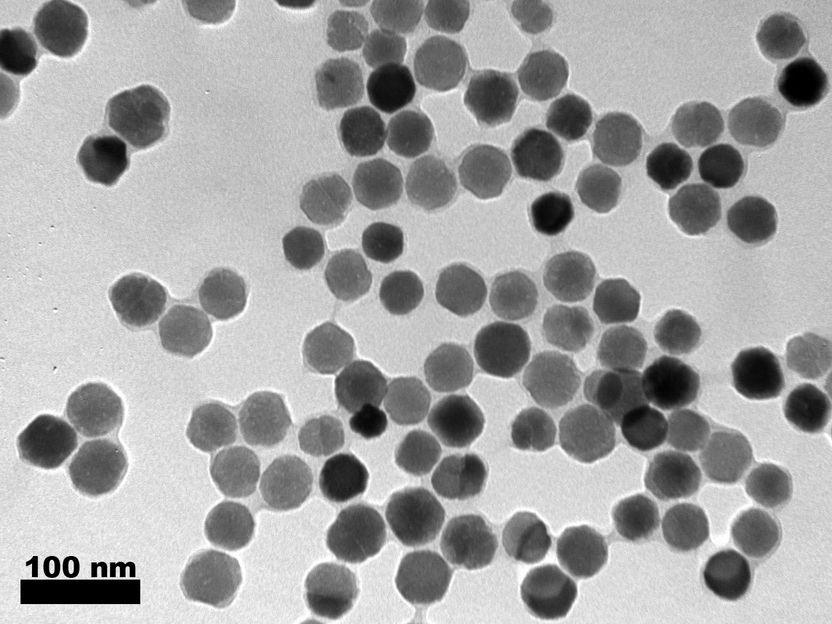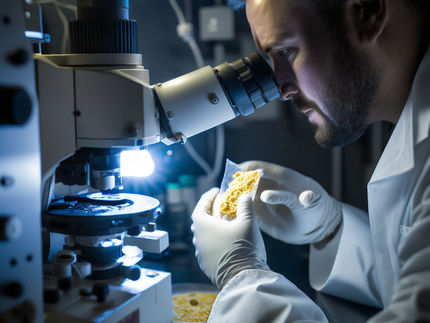Novel tools for biomedical applications: Bacterial magnetic nanoparticles
Developed and optimised a process for the isolation and purification of these particles from bacterial cells
Advertisement
magnetic nanoparticles biosynthesized by bacteria might soon play an important role in biomedicine and biotechnology. Researchers of the University of Bayreuth have now developed and optimised a process for the isolation and purification of these particles from bacterial cells. In initial tests, magnetosomes showed good biocompatibility when incubated with human cell lines. The results presented in the journal "Acta Biomaterialia" are therefore a promising step towards the biomedical use of magnetosomes in diagnostic imaging techniques or as carrier in magnetic drug delivery applications.

Magnetosomes isolated from magnetic bacteria.
TEM-image: René Uebe.
The magnetotactic bacterium Magnetospirillum gryphiswaldense produces intracellular magnetic nanoparticles, so-called magnetosomes. These are arranged in a chain-like manner similar to a string of pearls, thereby forming a kind of magnetic compass needle that allows the bacteria to navigate along the Earth's magnetic field. In contrast to chemically produced nanoparticles, magnetosomes exhibit a strikingly uniform shape and size of about 40 nanometres, a perfect crystal structure, and promising magnetic properties. Moreover, they are surrounded by a biological membrane that can be equipped with additional biochemical functionalities as required. The particles are therefore highly attractive for a number of biomedical and biotechnological applications.
An interdisciplinary team of scientists at the University of Bayreuth has now defined quality criteria for purified magnetosomes, which are required for future applications. In particular, these include the uniformity (homogeneity) of magnetosomes, a high degree of purity, and the integrity of the membrane that surrounds each individual magnetosome and provides stability. At the same time, the Bayreuth researchers established and optimised a method by which magnetosomes can be gently isolated from the bacteria. The newly developed procedure not only fulfils the quality criteria but is also adaptable for the isolation of larger quantities required in the broad range of applications envisioned in biomedicine and biotechnology.
The magnetosome purification process developed in Bayreuth is based on the physical properties of the magnetic nanoparticles. First, the magnetosomes are separated from other non-magnetic cell components by magnetic columns. Second, due to the high density of the nanoparticles, an additional ultracentrifugation step allows the removal of residual impurities. The quality of the purified magnetosome suspensions was assessed by physico-chemical techniques. In addition, the biocompatibility was tested in close collaboration with the Jena University Hospital. These analyses revealed high vitality values of magnetosome-treated human cell lines even at high particle concentrations. This indicates good biocompatibility according to relevant DIN standards, which represents a prerequisite for use of magnetosomes in magnetic imaging techniques or targeting of cancer cells by magnetically controlled drug delivery. Moreover, the nanoparticles might have great potential in the field of theranostics, which combines precise diagnosis with subsequent targeted therapy.
The optimisation and comprehensive characterisation of the isolation process using a wide range of analytical techniques has emerged from a close interdisciplinary collaboration on the Bayreuth campus involving Physical Chemistry (Dr. Sabine Rosenfeldt, Junior-Prof. Anna Schenk), Microbiology (Dr. Frank Mickoleit, Prof. Dirk Schüler, Dr. René Uebe), Process Biotechnology (Dr. Valérie Jérôme, Prof. Ruth Freitag), and the Northern Bavarian NMR Centre (Prof. Stephan Schwarzinger). Cell culture studies on the biocompatibility were carried out at the University Hospital in Jena (Cornelia Jörke, Dr. Joachim Clement).
















































